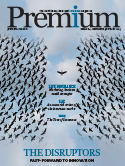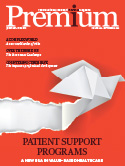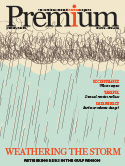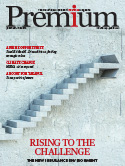Culture of Innovation
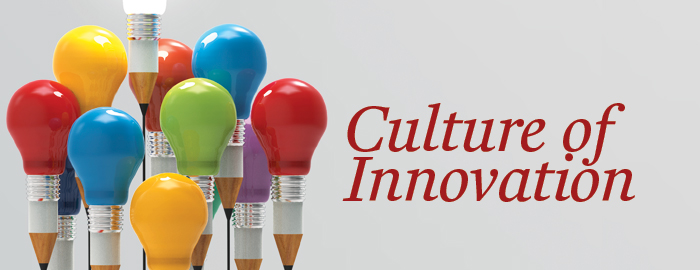
The insurance sector needs to attract and retain millennials through innovative practises, writes Bayna Al Awani.
We are currently experiencing one of the biggest generation shifts in recent history.
Baby boomers – almost 10,000 a day – are now retiring, paving the way for millennials to take the helm. But the challenge isn’t for industries simply to fill these positions with eager new employees. The real challenge is to attract millennials – now the largest generation in the workforce and whose working needs are somewhat different to that of their predecessors – and to retain them.
To achieve this, employers need to be more flexible in their approach, unlike previous generations.
Elon Musk, founder of SpaceX, creative director of Tesla and one of our generation’s most respected innovators, said: “Growing a business is as much about the innovation, drive and determination of the people who do it as it is about the product they sell.” In this vein, it is vital that the pursuit for an improved insurance company is done by recruiting new employees that are not only passionate workers, but are attracted by a company that offers consistent incentives to stay and develop over time.
So with a generation of millennials –who have often been criticised for having a tendency to jump from one job to another – what must a company do to keep them? There are three key factors – an in-depth understanding of this demographic and their priorities, putting innovation at the heart of the business, and providing sustainable professional growth opportunities.
Understanding millennials
Millennials are currently defined as being between ages 19 and 35, and it is encouraging to see that those already working in insurance find it a rewarding career.
This was demonstrated in a recent survey by Vertafore – an insurance industry connector – which found that 82 percent of millennials working in the insurance industry would recommend this as a career choice to others. Furthermore, with 40 percent of respondents stating that word-of-mouth was a key part of their career decision-making process, it becomes clear how important it is for businesses to have proper engagement with their millennial employees.
Innovation at the heart of business
As we live in a digital age, it’s clear that an online presence is imperative for a company to gain traction and interest from the next generation of workers. We must all strive for digital excellence. From online services to day-to-day customer interaction, it is vital for companies to display innovative and world-class services in the digital sphere. Companies need to provide resources for experimentation. New ideas of products, services and other value-adding solutions need to be continually tested before being rolled out by their respective businesses.
Forming strategic partnerships with government agencies is another essential aspect of driving innovation. Companies need to provide expertise, mentoring and business advice for young start-ups in their stakeholder network, whilst keeping in touch with the latest regulatory and market trends and experimenting in a real environment with some innovative concepts in order to achieve lasting digital transformation. Cross functional teams will work on new ideas, allowing those involved to get up to speed with the latest innovation methods.
A secure working environment
Growth and security within insurance are also high on the checklist for millennials. Often criticised for job hopping, we saw from the Vertafore report that two-thirds of millennial respondents have been in the insurance industry for at least three years. And they don’t have plans to leave anytime soon. Knowing that growth is a priority for prospective employees, it’s key for us to create transparent and linear growth opportunities for the youngest employees to stay for many years and arguably more importantly, stay engaged.
Engagement and employee retention can also be attributed to a work-life balance, something of which 50 percent of those in the survey prioritised. And we agree. We want our staff – and all staff across the UAE – to live a healthy lifestyle as much as possible.

Bayna Al Awani, chief innovation officer at National Health Insurance Company (Daman)
When organisations adopt a health-oriented strategy that prioritises the wellbeing of staff, it immediately impacts the overall employee-management relationship, which more often leads to increased loyalty. We know that a healthy person is likely to perform better and become more productive, thus lowering instances of absenteeism or even cases of illnesses.
Many companies are aggressively adopting technology in order to remain progressive and competitive. This correlates to the fact that the majority of millennials are satisfied at the use of their company’s technology and are given the right tools in order to compete and succeed. So this is why we must continue to both integrate updated tech and understand which tools millennial employees need and want to be successful, in order to maintain momentum and garner loyalty with our younger workforce.
It is clear that working for an insurance company is a popular career choice for millennials– but there’s still work to be done. A focus is needed on the community, as well as educational institutions. Abu Dhabi, and the UAE, are home to an abundance of world-class schools and universities, educating a community from a plethora of nationalities. Our youth is our future, and we need to harness the opportunity to work with such institutions in order to attract people to our industry.
Interestingly, millennials and those still in school today, all have a solid grasp of digital technology and social media platforms because it is already so widespread in their day-to-day lives. This allows us more time to focus and concentrate on other aspects related to innovation, rather than previous years where technology was such a priority. This generation shift is both exciting and intriguing, as it tests us not only as a company but individuals working as a collective to grow and develop our industry in the most innovate ways possible.









